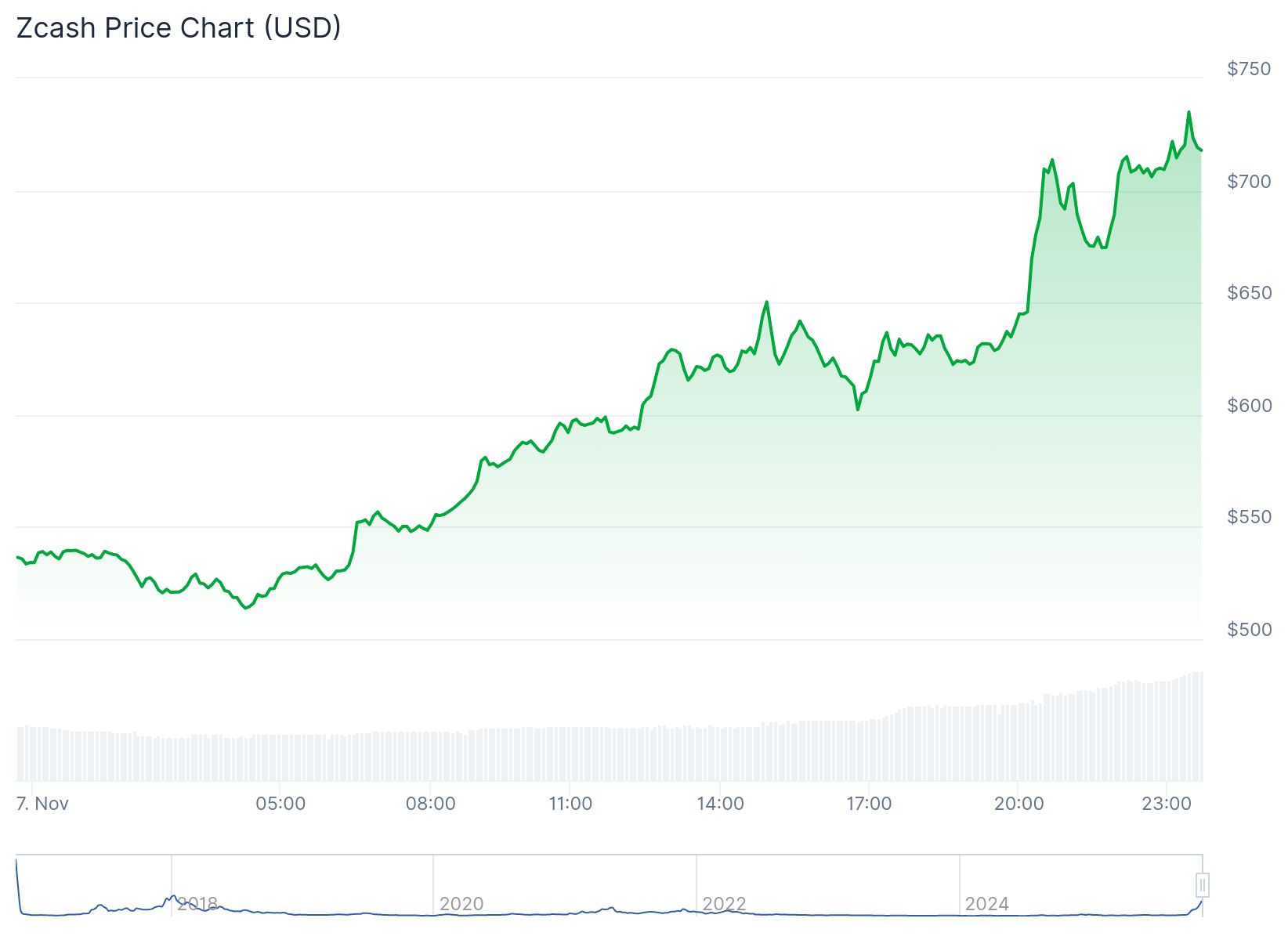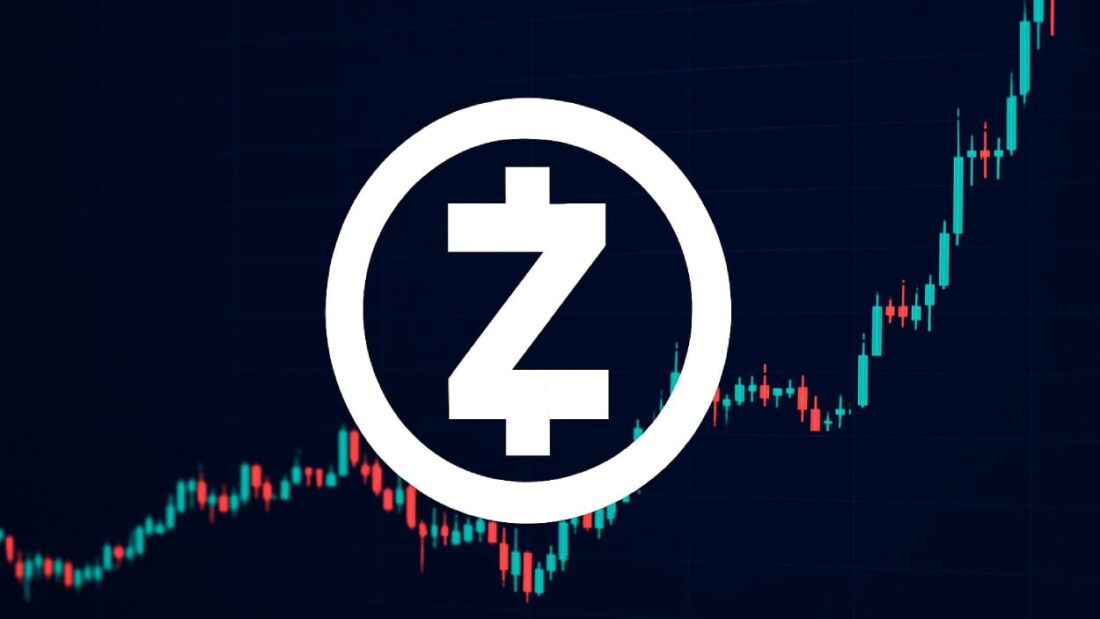Zcash has surged over 750 percent since early October, reclaiming a top 20 market position and reaching its highest price level in seven years.
Key Takeaways
- Zcash (ZEC) soared to $680, its highest since early 2018, while most major cryptocurrencies like Bitcoin and Ethereum saw double-digit losses.
- The privacy-focused coin reached a $10.9 billion market cap, surpassing Hyperliquid and reentering the top 20 crypto rankings.
- Shielded ZEC supply now exceeds 30 percent, signaling increased trust in privacy features and infrastructure upgrades.
- Arthur Hayes’ family office Maelstrom named ZEC its second-largest liquid holding, as institutional interest ramps up.
What Happened?
Zcash has staged a stunning comeback, climbing from around $75 in early October to more than $680 in early November. That 750 percent rally defied a broader crypto market downturn, where assets like Bitcoin and Ethereum saw declines of up to 26 percent. Fueled by privacy concerns, technical upgrades, and renewed institutional interest, Zcash has become one of the most discussed coins in the crypto space.
Zcash Climbs Back Into the Spotlight
Once considered a relic of the last bull cycle, Zcash (ZEC) has stormed back into relevance. It reclaimed the $200 level by October 10 and reached a high of $714 by early November, levels not seen since 2018. Its market cap now stands at $10.9 billion, pushing it past Hyperliquid and back into the top 20 cryptocurrencies.

Unlike the rest of the crypto market, which has struggled in recent weeks:
- Bitcoin has dropped 18 percent.
- Ethereum is down 26 percent.
- The GMCI 30 index is off by 25 percent.
Zcash’s rise stands in sharp contrast, driven largely by its core value proposition: privacy.
Shielded Supply Signals Real Usage
Zcash enables users to move their tokens into a “shielded” pool, using zero-knowledge proofs (zk-SNARKs) to obscure transaction details while maintaining blockchain verifiability. This opt-in feature is seeing growing adoption.
- Over 5 million ZEC, or 30.41 percent of total supply, is now held in shielded addresses.
- This suggests actual usage and belief in Zcash’s mission, not just speculative holding.
According to The Block’s analysts, holders are actively choosing to shield tokens, which indicates trust in the ecosystem’s privacy tools and improved wallet infrastructure.
Arthur Hayes and Institutional Capital Enter the Scene
Zcash’s momentum received a major boost from Arthur Hayes, co-founder and former CEO of BitMEX. Hayes recently disclosed that his family office, Maelstrom, has made ZEC its second-largest liquid holding after Bitcoin. Hayes has even suggested that Zcash could hit $1,000, citing its potential to power a new wave of truly private decentralized exchanges.
Derivatives Show Heat, But Risk Lingers
The Zcash rally has not come without turbulence. The derivatives market has exploded:
- $713 million in open interest on ZEC futures.
- $18.8 million in liquidations within 24 hours, including $14.5 million in short losses on Hyperliquid.
- Funding rates have turned deeply negative, suggesting many traders are betting against further gains.
One wallet reportedly secured $2.7 million in profit from a 32,000 ZEC long position, reflecting bullish sentiment even as analysts warn of a potential pullback below $450.
Privacy, Tokenomics, and Tech Drive Appeal
Several narratives have converged to boost Zcash:
- Rising concerns over financial surveillance in Europe and beyond.
- A renewed appreciation for privacy as a necessity, not a luxury.
- Technical updates like the Zashi wallet with Solana integration for improved accessibility.
- Strong fundamentals: 21 million max supply, Proof-of-Work consensus, and a halving event approaching.
These elements have positioned Zcash as an “encrypted Bitcoin”, capturing attention from both ideologically driven users and institutional investors.
CoinLaw’s Takeaway
I’ve followed crypto markets long enough to see privacy coins come and go, but Zcash’s latest run is different. This is not a meme pump or fleeting hype. ZEC’s rally is underpinned by real usage, meaningful wallet integration, and heavy-hitting endorsements like Arthur Hayes. In my experience, a token doesn’t climb over 700 percent during a market crash unless there’s something real driving it. Privacy is back on the table, and Zcash is leading that conversation.


































































